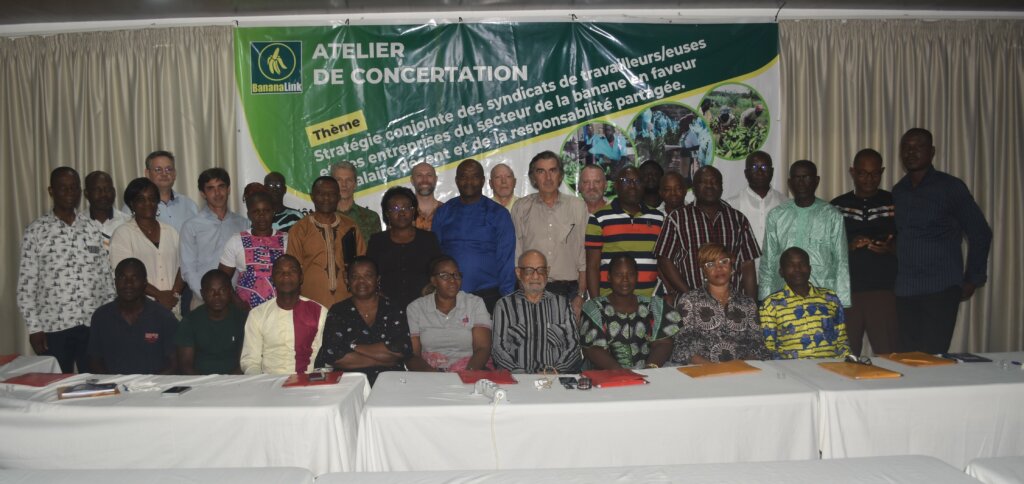An historic agreement on living wages has been reached in Côte d’Ivoire between banana exporting companies and trade unions. The agreement, which is the product of a three-year programme coordinated by Banana Link with the support of retailers and the Sustainable Trade Initiative IDH, is between the four major banana exporting companies of the country and a dozen trade unions, who between them represent the great majority of plantation and packhouse workers in Cote d’Ivoire.
A bipartite working group was established during a two day workshop in Abdijan in February, supported by the African trade association Afruibana, the International Union of Food and Agricultural Workers IUF and Banana Link. The group is charged with creating a framework for the first-ever national collective bargaining agreement for the banana sector, and with securing the support of European buyers for this route to achieve living wages for all 13,500 workers employed.
The producing companies and their two trade associations, OBAM-CI and OCAB on the one hand, and the recently established national trade union federation of banana workers, FETBACI, on the other, spent two days of intense social dialogue to reach an agreement on drafting a sectoral framework for negotiations on wages and other aspects of decent work. Crucial inputs were made by the national research institute CIRES-CI on current remuneration systems and wage levels, by the ILO West Africa office on “setting adequate wages” and the newly agreed guidelines on “decent work for agroindustry“. The IUF African banana workers’ coordination provided important context on the evolution of trade unionism in the sector over the last decade, and the French-based research institute CIRAD shared valuable information on the current market situation and a new tool for assessing the standard of living in banana workers communities known as the ‘Neighbour’ methodology.
The programme of work was made possible through the support of the IDH and six European retailers that source bananas in Côte d’Ivoire bananas : Tesco (who write more about their living wage commitments and the Cote d’Ivoire programme here) , Morrisons, Marks & Spencer, Carrefour, Lidl France and Aldi Nord.
Highlights from 2021 to 2023
After initial discussions with stakeholders in Côte d’Ivoire on a joint national approach with businesses and trade unions, the retailers agreed to support a process that would prepare the sector for collective bargaining towards living wages for all workers. This included the collection and validation of wage data, with retailers committing to contribute to wage improvements, thereby acknowledging their shared responsibility.
A team from the independent research institute CIRES-CI took on the role of interface in the collection and validation of data and produced a report setting out the information gathered. Two validation meetings with the eight trade unions present in two companies were also conducted by CIRES-CI.
Banana Link delivered two training workshops on living wages and collective bargaining, with support from the IUF African banana worker’ coordination, bringing together 45 trade unionists, half of them women. These training activities were crucial in ensuring that workers’ representatives and their organisations not only understand the different roles of stakeholders along the value chain, and the tools being used to assess wages by buyers and certifiers but are also empowered to engage in permanent dialogue with their employers on issues around remuneration systems and actual wages.
During the course of the programme other enabling factors that helped the parties reach agreement on the way forward came into play :
- The companies in the sector increasingly came together around issues of certification, living wages, wage systems, etc., thereby facilitating the construction of a national sectoral effort.
- After a number of meetings and consultation activities, in February 2023, ten trade unions from four companies set up a national federation bringing together the majority of workers in the sector for the first time, thereby opening up the opportunity to be the legitimate social partner in a national framework for negotiating with companies in the sector.
- The Ivorian government authorities carried out a review of the national minimum wage and consulted agro-industrial companies on the issue of setting minimum wages (SMIG and SMAG).
- Retailers in four European countries made public commitments to guarantee living wages throughout their banana supply chains and, most recently, stated that the most sustainable way to achieve this is through collective bargaining.
Banana Link’s International Coordinator, Alistair Smith, commenting on the successful programme, stated :
« Despite the difficulties of undertaking such a programme during the pandemic, the key players in the country have now agreed a solid national strategy to present to retail buyers and certifiers in the coming months. We are hoping that the retailers involved, and others who wish to join the movement, will recognise the importance of the route laid out to achieve living remuneration for all and will support through fair prices and other contributions to ensure that the process is a success. »
Retailers are invited to Côte d’Ivoire in September to visit plantations, discuss the progress with the national plan with the companies and trade unions, and share concrete commitments of their support for closing gaps between actual wages and living wages for the lowest paid workers.
